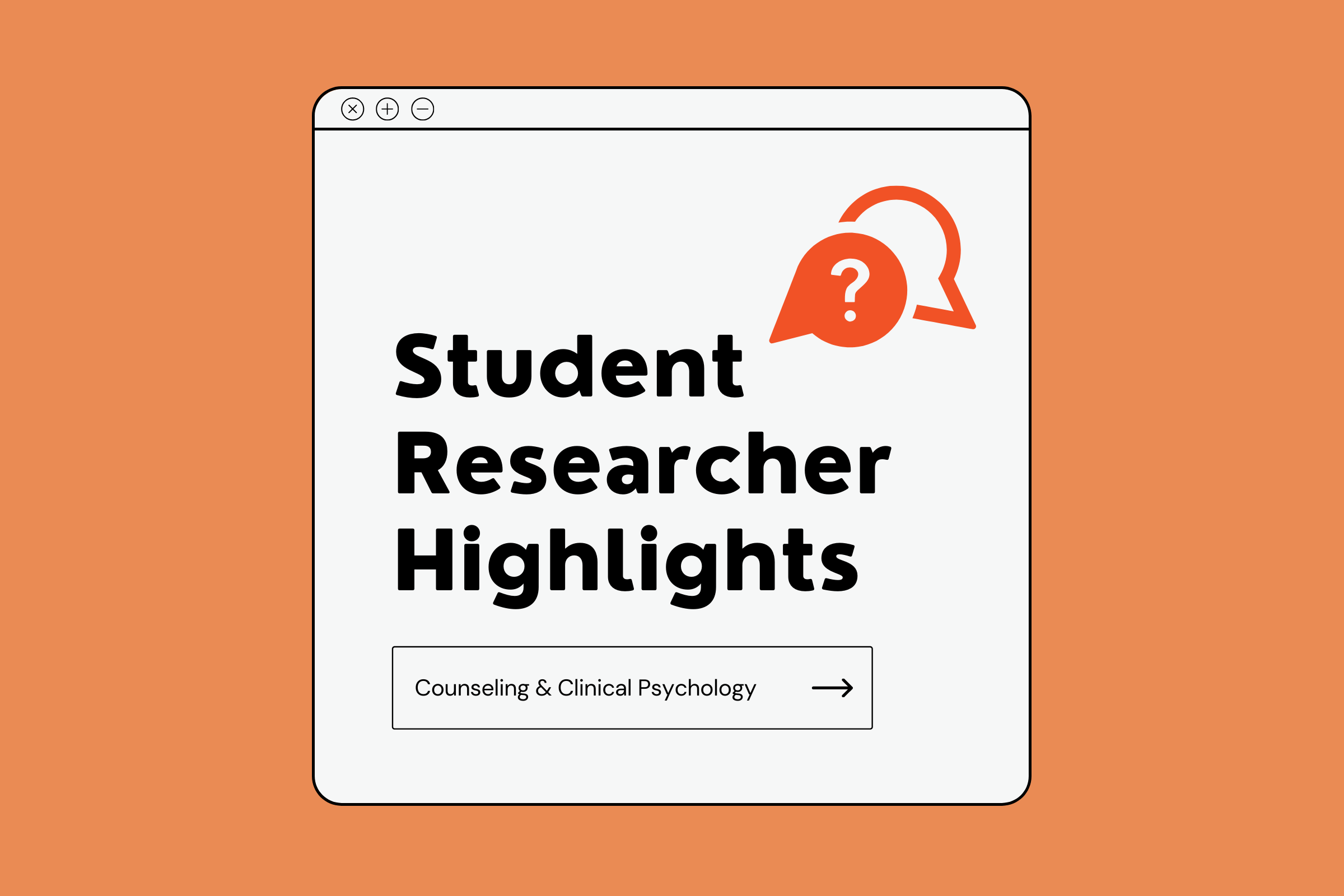This TC IRB blog series, Student Researcher Highlights, includes a sequence of recorded presentations hosted by Zahra Ladhani, one of the Research Writing & Ethics Interns, in collaboration with TC NEXT. This blog series offers insights into students' research background, their research goals, their future career paths, and how they navigated the IRB protocol submission process.
Each blog post in the series will highlight student researchers using excerpts from recorded presentations conducted during the Fall 2021 presentation series. Each student presenter engaged in an approximately 45-minute conversation with student attendees. This blog series offers themes, suggestions, and pathways as presented by students during the presentations. This blog mini-series is intended to provide some inspiration and insight into how an individual student's experience with research and the IRB unfolded at TC.
This mini-series featured two doctoral students Srishti Sardana and Ilana Gratch.
Study of Interpersonal Social Networks, Social Capital, and Mental Health Outcomes in All Persons Affected by the Refugee Crisis in Lebanon - A Dynamic Networks Approach
Srishti Sardana, Doctoral Student in the Counseling & Clinical Psychology Department

Srishti Sardana
Srishti’s dissertation study is “...based on two empirically-validated principles:
- The relationship between interpersonal problems and psychological distress is reciprocal and bidirectional and;
- Complex social networks influence the individual’s goal and life pursuits (with implications of increased social cohesion, ability to manage conflict, and motivation to recover from a depressed state – strong social networks buffer stress (Cohen & Wills, 1985).”
Her work aims to link social capital and support networks “...with positive mental health outcomes among all persons affected by adversity and crises in Lebanon including the Syrian refugees and the Lebanese host populations. Broadly, this study aims to explore ways to recognize and measure the interlinkages between individual- and environment-level factors in this population experiencing a complete breakdown of social and ecological systems.”
As a graduate student, Srishti developed skills in clinical psychology and goal-setting to support her career pathway. She recognized that developing research skills involves learning different types of IRB review categories and how best to engage with the IRB for a specific research project. Part of graduate school training involves knowing how to conduct studies better than years before and how to work in complex research sites. She attributes her skill development to the hands-on experience she received from her faculty sponsor mentor and mentee role.
The Institutional Review Board (IRB) Process
Srishti recommends students start the IRB process early, as early as when students first discuss their topic ideas with a faculty sponsor (for more information, please review The Importance of a Faculty Sponsor for Student Researchers). Because IRB approval often determines when a study might get funded, starting early gives students the best chance. Designing an ethical study can result in an intellectual and emotional experience. Researchers may have enthusiasm for their topic, but they cannot answer every question they propose. She advises that students work with templates and samples to build their IRB protocol submission (for a list of templates, please review our Submitting a New Protocol page). While it may be humbling to work through the nuances of a study design, the transition and final proposal will converge over time.
Srishti views the IRB administrative office as part of a research team. An IRB administrator wants to make sure that the important research work is getting out into the field in a responsible way and that reduces the burden on researchers. Once an IRB protocol is complete and the IRB protocol is approved, researchers can be at ease knowing that they have done their due diligence to ensure the rights and welfare of the research participant. And even if researchers encounter challenges in the field, they can contact the IRB office, seek guidance and support, and adjust the protocol (if needed) by submitting a modification. The IRB process is a source of learning, IRB administrators will ask researchers to answer questions that help develop and make feasible protocol parameters, and keep the researchers' internal accountability checks in place. Additionally, the IRB protocol and affiliated documents (e.g., consent forms, recruitment materials, etc.) provide researchers with a standard method that is consistent across sites and personnel.
Srishti offered advice to students:
- Start the IRB process and CITI training early.
- Data collection in the field is hard: Revisit the IRB protocol to see what is feasible in the field.
- The IRB protocol is a document, an agreement, of what the researcher proposed to conduct in the field. If parts of the study need to change, a researcher can submit a modification to an approved study.
- For research in international settings, keep the IRB-approved protocol updated on what is happening in the field. The IRB protocol should reflect what is actually happening in the data collection process with human subjects.
- Researchers should be flexible through the IRB process: from initial conceptualization, requested revisions, to approval and modifications. This is an important consideration especially as in-person studies were suspended due to the COVID-19 pandemic. Maintaining a way to ramp-down research, or transition from in-person to online can help a researcher maintain momentum, but still remain in compliance with the proposed IRB protocol. Rely on the IRB office for guidance. During the worst part of the pandemic lockdown, IRB administrators quickly developed plans to support researchers as they suspended in-person engagement and transitioned to online data collection methods. When in doubt contact the IRB office for support.
- Develop your own research voice: Srishti shared that as a younger trainee, she did not have a resounding research voice. However, with advice, mentorship, training, and skill development, she found her voice.
- Be clear in your research design: With clarity, a researcher can relay the study activity to a study participant and ensure the individual understands what is asked of them.
- Manage expectations: not all hypotheses live in the IRB protocol, but all aims do.
- Know the differences between a manuscript, raw data, and an IRB protocol.
Detecting suicide risk in adolescents and young adults: A machine learning-based analysis of nonverbal behaviors exhibited during suicide assessments
Ilana Gratch, Doctoral Student in the Counseling & Clinical Psychology Department

Ilana Gratch
Using a combination of existing data and data she collected while at Teachers College, Ilana’s doctoral research explores nonverbal behaviors exhibited during suicide assessments, including vocal characteristics and facial action.
Broadly, Ilana seeks to contribute to clinical psychological research by improving our understanding of suicide risk assessments and interventions. She acknowledged the challenges associated with studying such a complex phenomenon as suicide but emphasized the importance of such inquiry as a means of improving prevention and intervention.
Ilana’s motivation for conducting research is fueled by the potential clinical applications of her and her colleagues’ work. She is most excited when developing research questions that may have meaningful or thought-provoking clinical implications.
The Institutional Review Board (IRB) Process
Ilana encouraged students to begin the IRB process as soon as they begin to work with a faculty sponsor. She stressed the importance of writing out a draft IRB protocol for a faculty sponsor to review and to use the protocol drafting process as a means for further refining the project’s methodological approach. This process may take time, but will eventually lead to a project that is rooted in ethical principles, tailored to fit an IRB protocol submission, and suitable to present to the IRB office for review and approval. Writing for the IRB takes time, and compels the researchers to think about and fine-tune the study design. No human subjects research study can begin without IRB approval. Therefore, researchers should take advantage of templates, guides, and resources on the IRB website to develop a study in tandem with the requirements of an IRB protocol (please review Submitting a New Protocol for more information).
IRB administrators review protocols on a case-by-case basis and each study activity is reviewed in the context of the setting and risk/benefit impact on the participant. Ilana remarked that many student researchers experience similar challenges when writing IRB protocols in the counseling and clinical psychology field because studies from this field tend to include similar kinds of risk related to the study topic, setting, population vulnerability, or intervention proposed. Student researchers should expect to experience delays in their protocol review as IRB administrators may ask content-specific questions to better understand the risks and potential benefits of the study and how best to protect the participant. In this process, the researcher will likely become aware of potential risks that could lead to an Adverse Event, and how to safeguard and mitigate such risks (for more information, please review Understanding Potential Risks for Human Subjects Research).
Ilana offered advice to students:
- Become familiar with the IRB process early. Even if you do not plan to submit a protocol until a later date, learning what is expected of you early on can only benefit you later.
- Complete CITI training early. Because the course is self-paced, you can take your time to get through the modules and refer back to them later. Each CITI training certificate is valid for up to three years. After that time, you will need to complete a refresher course.
- Find someone who is willing to “get in the weeds” with you on the study before you start the IRB process. It’s one thing to come up with an idea for a research study, and another thing to think through every single step of its development; doing this with another person with research experience at Teachers College, such as your mentor or another student in your lab, can be tremendously valuable.
- Learn from others. Ask your colleagues if they are willing to share their IRB protocol submissions. Even though an IRB review administrator reviews a protocol on a case-by-case basis, student researchers can learn from how others submitted their IRB applications for review.
Reflections and Resources
Peer-to-peer support builds investment in research projects and overall graduate student life. Learning from the peers around you can help you refine your academic goals and projects. For more information about the IRB process, visit these links: How to Submit, Researcher Expectations, and The Assent Process with Minors.
